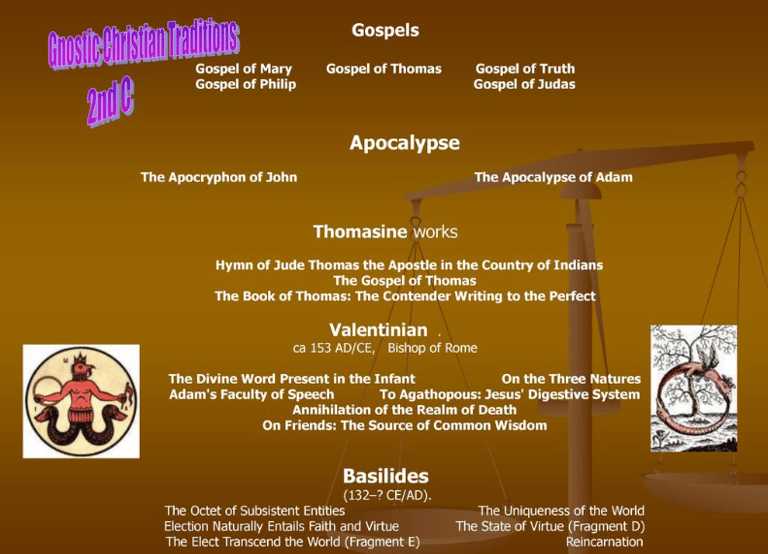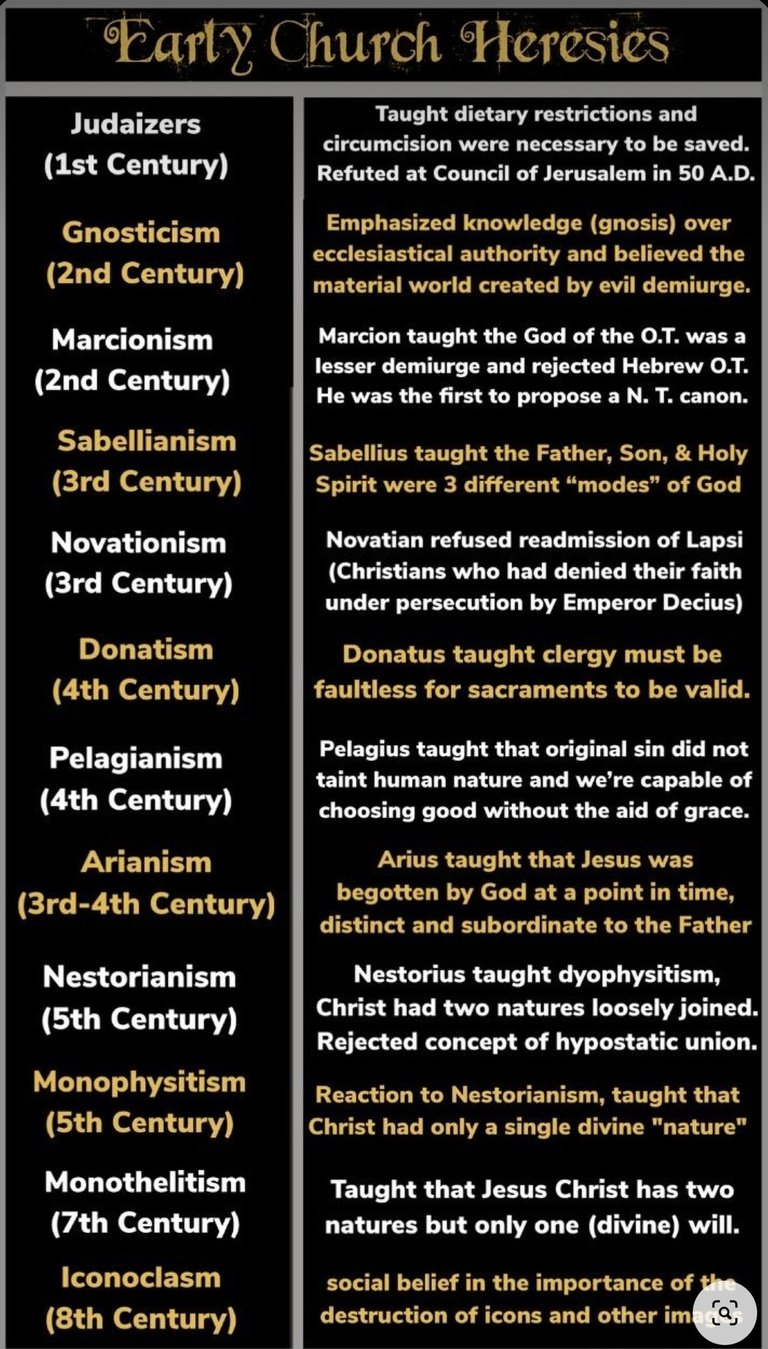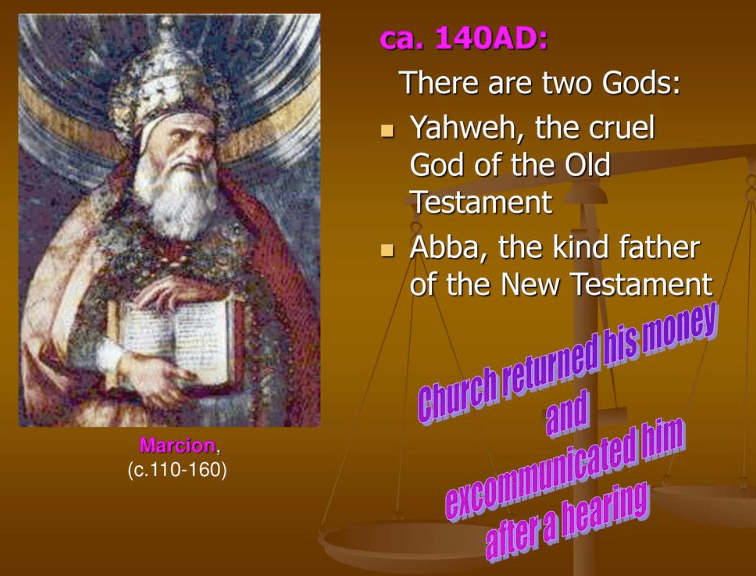What is Gnosticism and how did it early on corrupt the New Testament
A Brief Definition and Explanation of Gnosticism
Peter Jones, professor of New Testament at Westminster Seminary California and director ofChristian Witness to a Pagan Planet says this about Gnosticism - "Gnosticism is formed from the Greek term gnosis meaning knowledge, but it means here a particular form of knowledge, namely spiritual experience.' Like all pagan spirituality, so-called Christian Gnosticism engages in sacred technologies (occult meditations, chanting mantras, drumming, etc.) to access the higher, spiritual self, the self that is part of God. In this essentially out-of-body experience, all physical and this-worldly restraints, like rational thinking and a sense of specific gender, fall away. In a word, the experience of enlightenment is both the rejection of the goodness of the physical creation and an acquisition of the knowledge of the divinity of the human soul."
Basically, Gnostics see the human soul as divine. You look within for God.
There was no consensus on a Gnostic canon of scriptures. Gnostic groups had no scruples about rewriting and adapting other religions sacred writings to fit their fancy. Many of their own works were circulated in different versions. Various sects had their own preferred rendition. Further, Gnostic groups had no unified doctrinal statement within Gnostic groups. In fact, the Nag Hammadi find revealed that a variety of different beliefs existed among different groups and individuals. For instance, some taught celibacy and others did not.
Early Corruption of The Word of God
Purposeful efforts to alter and corrupt the New Testament began almost immediately after each Gospel and letter were written. For we are not as many, which corrupt the word of God: but as of sincerity, but as of God, in the sight of God speak we in Christ. 2 Corinthians 2:17 The word corrupt here is a translation of the Greek word kaphleuontev - kapaleuontes (kap-ale-loo-entace) which means a huckster. One scholar said this about the word - The word was used to describe shady "wine-dealers playing tricks with their wines; mixing the new, harsh wines, so as to make them pass for old. They not only sold their wares in the market, but had wine-shops all over the town..." where then peddled their corrupt wine claiming it was genuine. They made a bundle of money by their deception.
So how is this word used in reference to the Word of God? Gnostic hucksters, and others, took the pure word of God and, like the shady wine dealers, mixed in their own philosophies, opinions and perversions and they peddled it all over as the real thing.
We know that false gospels and false letters were written and circulated while the Apostles were still alive. That ye be not soon shaken in mind, or be troubled, neither by spirit, nor by word, nor by letter as from us, as that the day of Christ is at hand. 2 Thessalonians 2:2 It is obvious that someone had written a letter and was circulating it, claiming that is was from the Apostle Paul and other disciples. Paul says the letter is a bogus, fake, a fraud."
But there were false prophets also among the people, even as there shall be false teachers among you, who privily shall bring in damnable heresies, even denying the Lord that bought them, and bring upon themselves swift destruction. And many shall follow their pernicious ways; by reason of whom the way of truth shall be evil spoken of. And through covetousness shall they with feigned words make merchandise of you: whose judgment now of a long time lingereth not, and their damnation slumbereth not. 2 Peter 1:3 These false prophets and teachers are said to"privily...bring in damnable heresies." That is, they secretly introduced spurious (unauthentic, counterfeit or bogus) teachings that were "damnable heresies" or perversion of the truth. They sought to peddle these heresies among believers. And how would they do that? Certainly by their slick teachings but likely also in their writings and corruptions of what God had given in the New Testament.
An Overview Of Gnostic Heresies
Let's look at some of the Early Heresies that developed in the days of the Apostles, and shortly afterwards. The beginnings of these heresies are alluded to in the Epistles John, Paul and Jude. Let's look at several of these places.
I marvel that ye are so soon removed from him that called you into the grace of Christ unto another gospel: Which is not another; but there be some that trouble you, and would pervert the gospel of Christ. But though we, or an angel from heaven, preach any other gospel unto you than that which we have preached unto you, let him be accursed. Galatians 1:6-8 Someone was promoting a false perverted letter or letters, and many in the church of Galatia were buying into the lie.
KJB - And every spirit that confesseth not that Jesus Christ is come in the flesh is not of God.... 1 John 4 The NIV says, Every spirit that does not acknowledge Jesus is not of God.... You see that the NIV leaves out the word "Christ." Why? It is because it was translated from the Alexandrian line of Greek texts that had been corrupted by the Gnostics. The so called "Christian" Gnostics believed in a dualistic Jesus Christ. Jesus was the physical Jesus and Christ was the spiritual Jesus. However, suffice it to say that these corrupt teachings influenced some of the scribes who changed the Apostolic texts to reflect their Gnostic beliefs.
Beloved, when I gave all diligence to write unto you of the common salvation, it was needful for me to write unto you, and exhort you that ye should earnestly contend for the faith which was once delivered unto the saints. For there are certain men crept in unawares, who were before of old ordained to this condemnation, ungodly men, turning the grace of our God into lasciviousness, and denying the only Lord God, and our Lord Jesus Christ. Jude 1:3-4 This verse makes it obvious that "ungodly men" were turning the "grace of our God into lasciviousness." That is what Gnostics did. They taught that the flesh was evil and therefore, it does not matter what you do with it.
Gnosticism, had the biggest impact on early Christianity and also had a major influence on the transmission of New Testament, and accounts for many of the differences between the Traditional line and the Alexandrian line of manuscripts.
Gnosticism in General
There was no unified doctrinal statement among Gnostic groups. There was no consensus on a Gnostic canon of scriptures. Gnostic groups had no scruples about rewriting and adapting other religions sacred writings to fit their fancy. Many of their own works were circulated in different versions. Various sects had their own preferred rendition.
While my research indicates that Carpocrates was the founder of the "Christian" Gnostics in the first half of the second century A.D., I do not know for sure that there were not others that preceded him. There were sects of Gnostics before him that used other religions and philosophies as their basis. However, we know that Carpocrates corrupted Christian teachings because of what Irenaeus wrote. The earliest and most vivid account of the Carpocratian Gnostics can be found in Irenaeus (130-202 A.D.) work titled Against Heresy. This sect did not believe Jesus was divine. His followers did not believe they had to follow the Law of Moses or any morality. They were very licentious (immoral) in their behavior.
Gnosticism, in all of its varieties, was the most influential heresy faced by the early Church
Not only did the Gnostics corrupt many readings found in the New Testament, but offered their own writings as inspired scriptures, such as the The Gospel of Thomas, The Gospel of Peter, The Gospel of Philip, The Gospel of Judas, The Gospel of the Ebionites, The Gospel of The Twelve, The Gospel According To The Hebrews (also called The Gospel According To Matthew, not to be confused with the real Gospel of Matthew), The Gospel According to the Egyptians, The Gospel of Mary (Magdalene), The Acts of Andrew, The Acts of Peter, The Acts of John, etc. Gnosticism had a variety of forms and sects, which broadened its base and growth. Historian Will Durant calls Gnosticism "the quest of godlike knowledge (gnosis) through mystic means" Durant is correct. Gnosticism is thinly veiled Pantheism. Pantheism is the doctrine that identifies God with and in the whole universe, every particle, tree, table, animal, and person being are part of GOD. Or, to explain it in a very basic way, the Greek word pan = all.The Greek word theos = God). Therefore it literally means "God is All" and "All is God".
The Gnostics taught that the physical (material) is evil and the spiritual (non-material) is good. Thus, a good god (spiritual) could not have created a physical world, because good can not create evil (that is the spiritual would not create the physical). So the Gnostic god created a being (or a line of beings called aeons) removing himself from direct creation. One of these aeons, or gods, created the world. The so-called Christian Gnostics believed that Jesus was one of these aeons who created the world. Some Gnostic taught that Jesus did not have a physical body. When he walked on the earth, he left not footprints because he never really touched the earth (he being spiritual and the world physical). Others taught that only our spiritual bodies were important, so the physical body could engage in whatever acts they desired because only the spiritual body would be saved. Still other Gnostics taught that the physical body was so evil that it must be denied in order for the spiritual body to gain salvation, thus shunning marriage and certain foods.
The influence of Gnosticism can be seen in some of the heresies of today. For example, many of the teachings stated above are found, in revised form, in the teachings of the Jehovah's Witnesses. To the Jehovah's Witness, Jesus is a created god, not God manifest in the flesh. It is no wonder that the Watchtower's New World Translation changes "God was manifest in the flesh" and replaces it with "He was made manifest in flesh."
Excerpts from Pastor David Brown, Ph.D. click to download entire file
Gnostic Doctrines found in the Critical Text - affecting all modern Bible Versions
God is the Universal Father of all mankind.
Jesus was not God incarnate.
Deny the incarnation of Jesus Christ
Deny some of the attributes of Jesus Christ (omnipotence and omnipresence)
Jesus was the son of Joseph, not the Son of God
The Lord Jesus Christ is not "Lord"
Jesus had a sin nature and was not perfect.
The resurrection of Christ was spiritual and figurative, not bodily.
The second coming of Christ is not literal.
Man is bi-sexual (Sodomy is all right).
Marriage and sexual propagation is evil.
Lucifer is the Savior.
Favor idolatry, fornication, adultery and homosexuality.
Redemption includes the whole world (universal salvation).
Heaven is not a literal place, but is figurative.
Info from Pastor D.A. Waite, Th.D.; Ph.D. www.BibleForToday.org






